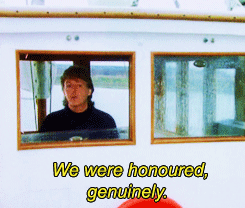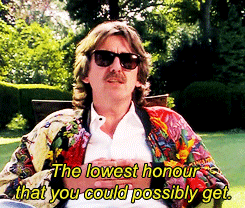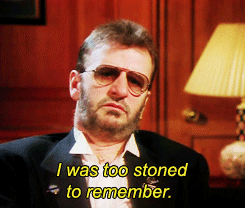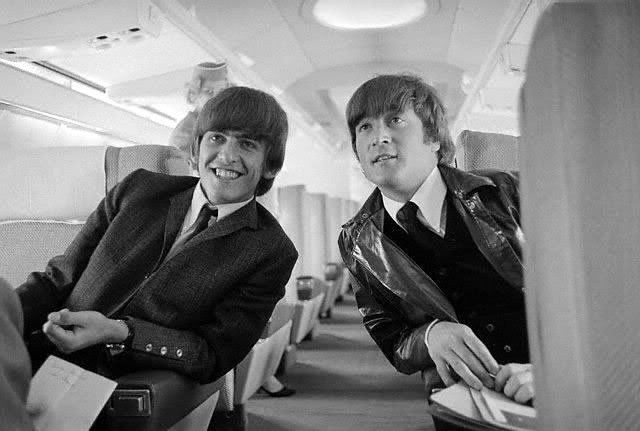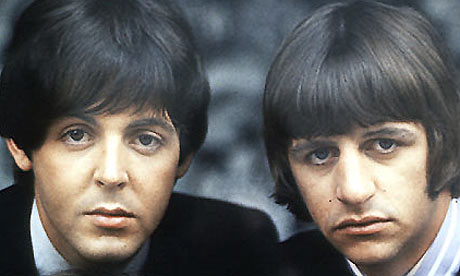I caught up with Jude at least year's Fest for Beatles Fans in Chicago, and she cheerfully agreed to do an interview with me. Finally, after much delaying and delinquency on my part, Jude and I were able to chit-chat about Shoulda Been There, Shivering Inside, and her upcoming third volume in the series, She Loves You.
First of all, congratulations on the first two novels in this series, Shoulda Been There and Shivering Inside - it's absolutely fantastic work. I'm sure all the fans of your work are wondering: when is the next book (She Loves You) going to be ready, and when can we get our hands on it?
Thank you! She Loves You will be out for John's birthday (9 October) 2013.
I've had quite a few "interruptions" in the writing process this year since we've moved TWICE (from Alabama to Dallas, TX and then on to Louisiana three months later). Furthermore, my husband just had his fourth heart surgery in the last 18 months just a few weeks ago. Very scary!
Like thousands of other Americans, we faced unemployment during 2010-2011 and the incredible stress that it generates. But now, we have a new job, are all settled in our new home in Louisiana, and Rande's new heart is working amazingly well; he's even running four miles every other night. So, I'm writing like a madwoman!
The first book, Shoulda Been There, covers the period of time from John's birth until The Beatles bring Brian Epstein on as manager. The second book, Shivering Inside, covers the "blossoming" of Beatlemania in Britain, right up to the birth of Julian Lennon. What events are being covered in the new book, She Loves You?
She Loves You is "the conquest of America." It opens on the Spanish Riviera, with Brian and John's holiday together, and it will conclude at the end of 1965. (So many memorable dates and song compositions fill that time frame!) It's the era that readers remember most fondly -- Beatlemania!
Besides the obvious events like the Ed Sullivan Show and the Royal Command Performance, there are other lesser-known events in the book (like The Beatles shows in Wales, for example). Larry Kane has been so kind to agree to write the Foreword for the book, and he will be working closely with me on details for The American Tour. And Richard Langham is graciously helping me again with details for the recording sessions. I've also been in touch with John C. Winn whose amazing transcripts of the recording sessions are so, so, so important to the text. (His book, Way Beyond Compare, is great!) I'm blessed to have a fantastic group of experts working on the project.
I'm glad you mentioned Richard Langham and the recording sessions, because I wanted to ask you something about Shivering Inside. You've written an absolutely gripping chapter in that book that covers, in great detail, the day-long session in which "the lads" recorded Please Please Me. (It was almost like being in the studio with them!)
But you seem to indicate, especially with songs like "Baby, It's You," that John was writing and singing his songs with Julia in mind. In fact, you say the same thing, essentially, in Shoulda Been There when you describe John writing "There's A Place."
I'm interested to hear you elaborate a little more on this idea. Do you think John ever just wrote love songs for "the bairds," for Cynthia, for Yoko, etc.? Or do you see Julia as always there, even if it's just in the subconscious background?
There are definitely some songs for Cynthia - "Do You Want to Know a Secret" for example, which was penned in the Falkner Street apartment that Brian had "given" John and Cyn as a wedding gift. It had been Brian's secret place for romantic trysts, and now John's secret wife, Cyn, was there with him. The song was for his bride. Some people have suggested that "Norwegian Wood" was written for Sonny Freeman or even for Maureen Cleave. Of course, we all know the origin of "Sexy Sadie" and "Dear Prudence." Those are obviously not for Julia. And admittedly, some of John's songs were dashed off -- commercially manufactured. But the bulk of John's songs are about Julia and for Julia.
He doesn't try to hide this fact. In the song, "Julia," he says, "Half of what I say is meaningless, but I say it just to reach you, Julia." So there.
But if a listener doesn't want to take John's word for it, look at the lyrics to some of his best known songs:
"Here I stand, head in hand,
Turn my face to the wall ...
If she's gone, I can't go on,
Feeling two foot small.
Everywhere people stare,
Each and every day,
I can see them laugh at me
And I hear them say,
"Hey! You've got to hide your love away!"
Remember the true-life episode that occurred when John went back to Liverpool College of Art only a month after his mother had been killed by that drunk driver? (This can be found in Shoulda Been There, Vol. 1 of the Lennon series.) A girl yelled at John across the registration room, "Hey John? It was your mother who was killed wasn't it?" Isn't that exactly what John is singing about? His pain, his loss, and the burden of acting normal in a callous world? The song is so autobiographical. A great portion of John's songs are.
Look at the lyrics of "I'll Get You" and "I'll Cry Instead" and "There's a Place." All for Julia. And of course, even more obvious are the words to "I'm A Loser" and "Help."
Even John's selection of cover songs reveals his life's story. In one version of "You Really Got a Hold on Me," he ends the song by saying, "You really got a hold on me, Mother." And as you mentioned, "Baby, It's You" is his homage to the woman that Mimi disparaged, but John always desperately loved. Listen to his cover songs on Live at the BBC and you'll hear John's angst. John is telling you who he is ... he never tried to pretend that he was someone else. And Julia IS always there beside him -- albeit at times, in the background.
I wrote in Shivering Inside: "Julia was the girl in every song." Okay, maybe not EVERY song, but damn close.
I was recently reading Jim O'Donnell's book, The Day John Met Paul, and I noticed that he kind of does what you're doing in your books, in terms of gluing together historical facts with some "controlled speculation" to flesh it all out - was O'Donnell any kind of influence or inspiration for you? Or - if not O'Donnell - what was it that inspired you to write a historical novel of this nature?
Spot on! The Day John Met Paul is my single favorite Beatles volume. O'Donnell is, in fact, the only author to whom I've ever written. After reading Jim's work, I wrote him to say that more than any writer out there, he feels and loves Liverpool as I do. He breathes Liverpool. He understands the city and its culture.
Amazingly, a few weeks later, Mr. O'Donnell found me and rang me up. I was working as a YMCA Executive in Kansas City at that time and missed his call. But my teenage son excitedly hunted me down at work and said, "Mom, some New York Beatles author wants to talk to you!! He's calling you again tonight! He wants to know about your book!"
That night, Jim O'Donnell spent over an hour with me on the phone, encouraging me to finish Shoulda Been There, to self-publish the work, and to use my speaking abilities to sell, sell, sell! Because of that phone call, I self-published (with the guidance, help, and tireless efforts of my husband, Rande), and Rande and I took it upon ourselves to publicize and sell the book at conventions, clubs, fests, and any venue possible. (Of course, I must admit I have the best Publicity Agent in the world, Jenn Vanderslice of Moonglow PR!!!!!! She does an incredible amount of work on both books. She's amazing!) And after the book came out, I received several e-mails from Jim O'Donnell, congratulating me and cheering me on.
My earliest inspiration, however, was Irving Stone. As a teenager, I was addicted to his very accurate and painstakingly-researched biographical novels: The Agony and The Ecstasy (Michelangelo's biography), Lust for Life (Van Gogh's), Those Who Love (John Adams), Passions of the Mind (Sigmund Freud), Love is Eternal (Abraham and Mary Todd Lincoln), and others. I read every one of Stone's books, marveled at his extensive research. In high school, I made a vow to write a book just like that someday.
As an adult, I was reading Stone's The Origin (biographical novel on the life of Charles Darwin) when I decided that the time was right to write John Lennon's story using that same format. If 900 pages could be written about Charles Darwin's life of fossils, rocks, and scientific discovery, then how much more would people love a book about John Lennon? I knew it would be a thrilling biography.
One of the things I most enjoy about your books is that, where you've written the "conjectural conversation" bits - the dialogue between, say, John and Mimi, or John and Paul, etc. - you've really captured John's "voice" and personality in a remarkably authentic way. It's very believable, and I don't think the reader ever finds himself thinking, "Oh, John would never say that," or "John wouldn't think that way." I'm curious: how did you manage to get so far inside John's head that you're able to reproduce his voice so well? Or, put another way, when you have to write a bit of dialogue, how do you prepare to speak for John?
Well, John has been part of my life since I was 9 years old. Hardly a day has gone by in 40 years when I haven't listened to John speak or sing ... or watched him on a video. I make this a part of every day -- on purpose.
I have lists of all of John's expressions (garnered from periodicals, tapes, DVD's, interview CD's, etc.), lists of his mannerisms, facial gestures, and reactions to various stimuli. Every time there's a spare moment, I watch John and record what I see. When I'm driving my car, his interview CD's are playing.
I've also read all of his books (including Skywriting by Word of Mouth) over and over again and been very privileged to read many of his letters that aren't available to the general public. I have a computer file full of "John Quotes" to use, gleaned from those books and letters.
Confession time: I'm also a Beatles book junkie. Over 500 books about John fill my Beatles collection ... and I don't just collect them: I read every word, underline, make notes, find discrepancies ... and research John constantly.
I also do the same for Brian, George Martin, and the other Beatles. Right now, for example, there's a sheet next to me with notes that reads:
Use for Brian
I must say ...
I rather think ...
I don't suppose ...
Would you be so kind as to ...
These are expressions I've observed Brian using in old VHS tapes and on DVDs. I record the actions, expressions, etc. of everyone connected to The Beatles.
Yes, yes, yes ... obsessive! So true.
In order to make you feel as if you are there, as if you KNOW each of the people in a chapter, I have to study them and recreate them accurately. I can't "make up" things about them, or I'd be creating a fictional character. I have to present to the reader the real person, the actual John or Paul or George. It's a serious obligation, because these are real people who lived (and are living) real lives. I must be true to who they were and are. It's a serious responsibility.
As I read your books, another major feature - a major selling point, I should say - is the way you juggle and hold together in respectful tension those places in the story where there are historical discrepancies.
So, for example, there are all sorts of stories about Stuart Sutcliffe being attacked by a gang of street-toughs, and questions about when it happened or how much John was involved, etc. Or, there are discrepancies in the record as to whether or not the Beatles really got booted from the Indra club because of an old lady's complaint about the noise level. In your narrative, you manage to pull off the impossible task of telling the story while somehow leaving room for all of the competing "facts" to find a place.
You mentioned earlier that She Loves You begins on the Spanish Riviera, so, of course, the big question is this: how are you going to recreate the most conflicted and volatile story of them all, the famous "John-and-Brian on vacation in Spain" story? I don't expect you to show all of your cards here, but perhaps just a general trajectory - are you going to skirt the story somewhat, face it head-on, side with one version or another, try to blend all the stories together in a way that they all make sense?
Okay ... I can't tell you. But I will tell you this. I struggled and struggled with a way to present all 18 completely different versions of what happened on the Riviera. I'm used to there being two or three different versions of one event ... but 18? C'mon!!
I worried that there would be no way to tell the story without wandering into fiction or speculation, and it is my responsibility to tell the absolute truth when presenting John's life story. I really lost sleep over a way to rectify the divergent accounts.
Then one afternoon in Dallas, TX, I went out for my daily run (I try to do at least 3.5 miles each day) and as is my custom when I run, I was praying. During the last mile, Wham! The solution hit me! I ran home, ran up to The Beatles room, stood perspiring at my computer, and typed the last two or three pages of the chapter before I forgot what I wanted to say. And it's the truth. And it works.
Right now, I'm writing the chapter in which John batters Bob Wooler at Paul's 21st birthday party, and a similar situation exists. The stories are all over the board concerning what happened that night. Rumors, lies, and outright lies ... cover-ups and milquetoast accounts. It's hard to find the truth in the mire.
I'm running and praying again tonight. The answer is bigger than I. "Gimme some truth!"
This might be more of a "PR and Marketing" question, but - so far, anyway - all of your book titles in this series begin with the letters "Sh" - Shoulda Been There, Shivering Inside, She Loves You. I'm assuming that's deliberate and that you intend to stick with the pattern for the remaining books. Should we expect to see titles like Shoulda Known Better, She Said She Said, and, perhaps Sheepdog Standing?
You got it!! Each cover will be a brown tone ... and each will include a work of art (HINT: something BIG is about to be announced about this in the next month ... stay tuned for thrilling news!) depicting John looking at the reader ... and each title will be a "Sh" title. She Said, She Said is Vol. 4 and Shoulda Known Better is Vol. 5. The final volume will be, of course, Shine On.
That's great to hear, and we'll certainly be looking forward to reading each and every one of those upcoming volumes. Thank you so much for your time, Jude, it's been a pleasure!
Thank you so much for interviewing me! I'm honored. I hope this affords a glimpse into the writing process. Now ... back to work for me! She Loves You beckons.
(My website is On the Rock Books for your readers who'd like to sample a chapter and who'd like to order "the bloomin' bookes"! As we say in Liddypool, TA!)

